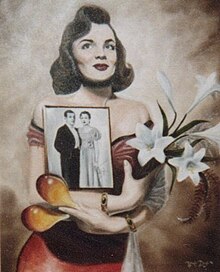Alys Robi
Alys Robi ( Alice Robitaille ; born February 3, 1923 in Québec , † May 28, 2011 in Montreal ) was a Canadian singer.
The daughter of boxer Paul Robitaille took part in talent shows as a child and performed at the Capitol Theater (in the revue Ten Nights in a Bar Room ) and the radio stations CHRC and CKCV. She studied singing, dance and acting with Jean Riddez and Rose Ouellette in Montreal and was employed at the Théâtre National for over a year . She was discovered in the Esquire Club in 1942 by Morris Davis , a producer with the CBC , and hired for the shows of Lucio Agostini and Allan McIver .
Her fondness for the Latin American repertoire ( Tico-Tico no Fubá , Jalousie , Besame Mucho ) made her known in the 1940s. She sang in the program 1944-48 Latin American Serenade of the CBC, came into New York cabarets (including The Blue Angel ) and the NBC program Carnation Contented Hour and 1947 in the first television programs of the BBC on. During the Second World War, she also performed in front of Canadian troops.
In 1948 a car accident interrupted her career. She subsequently suffered a mental breakdown and spent five years in a mental institution, where she was treated with electric shocks and a lobotomy. Several attempts at a comeback after this time were unsuccessful. Luc Plamondon dedicated the chanson Alys en cinémascope to her in 1979 (sung by Diane Dufresne ). Her life became the subject of the television series Alys Robi and the film Ma vie en cinémascope (2004) by Denise Filiatrault with Pascale Buissière in the leading role, which received several awards.
Robi himself wrote two autobiographies: Ma Carrière, ma vie (1980) and Long Cri dans la nuit: Cinq Années à l'Asile (1990). In the latter she reflected on her years in psychiatry. In 1985 she was honored with the Order of St John .
swell
- The Canadian Encyclopedia - Alys Robi
- Alys Robi in the Internet Movie Database (English)
- Bilan du siècle - Alys Robi
- Sounds like Canada - Alys Robi
- Le Devoir, May 30, 2011 - Alys Robi (1923-2011) - Une grande star de la chanson des années 40 s'éteint
| personal data | |
|---|---|
| SURNAME | Robi, Alys |
| ALTERNATIVE NAMES | Robitaille, Alice |
| BRIEF DESCRIPTION | Canadian singer |
| DATE OF BIRTH | February 3, 1923 |
| PLACE OF BIRTH | Quebec City |
| DATE OF DEATH | May 28, 2011 |
| Place of death | Montreal |
